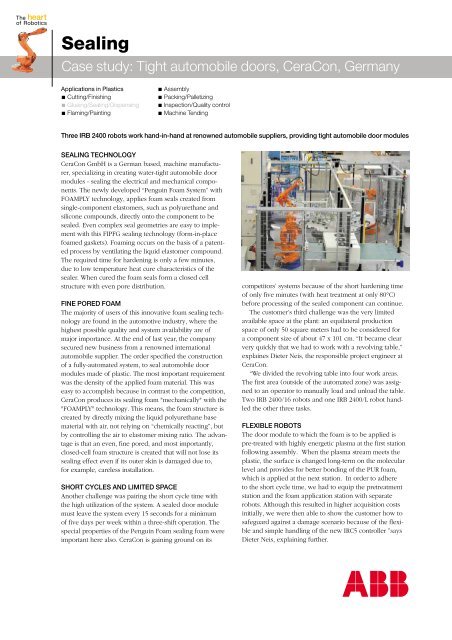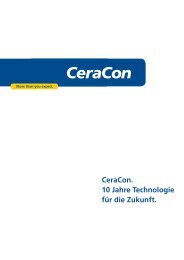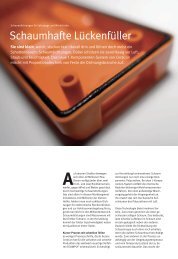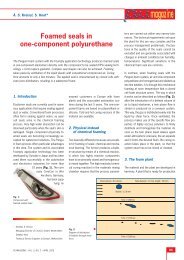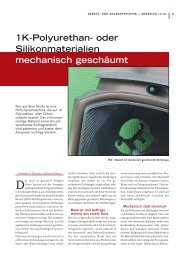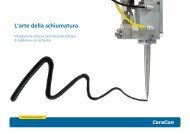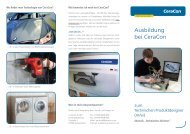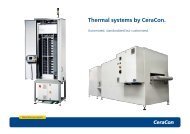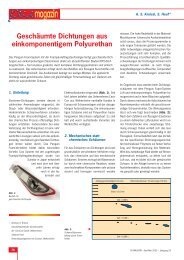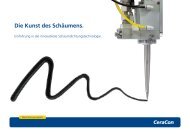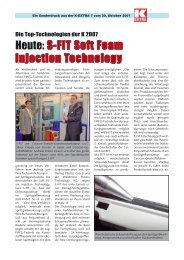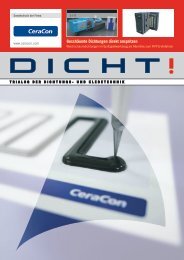Sealing - Ceracon
Sealing - Ceracon
Sealing - Ceracon
You also want an ePaper? Increase the reach of your titles
YUMPU automatically turns print PDFs into web optimized ePapers that Google loves.
<strong>Sealing</strong><br />
Case study: Tight automobile doors, CeraCon, Germany<br />
Applications in Plastics<br />
Cutting/Finishing<br />
Glueing/<strong>Sealing</strong>/Dispensing<br />
Flaming/Painting<br />
Assembly<br />
Packing/Palletizing<br />
Inspection/Quality control<br />
Machine Tending<br />
Three IRB 2400 robots work hand-in-hand at renowned automobile suppliers, providing tight automobile door modules<br />
SEALING TECHNOLOGY<br />
CeraCon GmbH is a German based, machine manufacturer,<br />
specializing in creating water-tight automobile door<br />
modules - sealing the electrical and mechanical components.<br />
The newly developed “Penguin Foam System” with<br />
FOAMPLY technology, applies foam seals created from<br />
single-component elastomers, such as polyurethane and<br />
silicone compounds, directly onto the component to be<br />
sealed. Even complex seal geometries are easy to implement<br />
with this FIPFG sealing technology (form-in-place<br />
foamed gaskets). Foaming occurs on the basis of a patented<br />
process by ventilating the liquid elastomer compound.<br />
The required time for hardening is only a few minutes,<br />
due to low temperature heat cure characteristics of the<br />
sealer. When cured the foam seals form a closed cell<br />
structure with even pore distribution.<br />
FINE PORED FOAM<br />
The majority of users of this innovative foam sealing technology<br />
are found in the automotive industry, where the<br />
highest possible quality and system availability are of<br />
major importance. At the end of last year, the company<br />
secured new business from a renowned international<br />
automobile supplier. The order specified the construction<br />
of a fully-automated system, to seal automobile door<br />
modules made of plastic. The most important requirement<br />
was the density of the applied foam material. This was<br />
easy to accomplish because in contrast to the competition,<br />
CeraCon produces its sealing foam "mechanically" with the<br />
"FOAMPLY" technology. This means, the foam structure is<br />
created by directly mixing the liquid polyurethane base<br />
material with air, not relying on “chemically reacting”, but<br />
by controlling the air to elastomer mixing ratio. The advantage<br />
is that an even, fine pored, and most importantly,<br />
closed-cell foam structure is created that will not lose its<br />
sealing effect even if its outer skin is damaged due to,<br />
for example, careless installation.<br />
SHORT CYCLES AND LIMITED SPACE<br />
Another challenge was pairing the short cycle time with<br />
the high utilization of the system. A sealed door module<br />
must leave the system every 15 seconds for a minimum<br />
of five days per week within a three-shift operation. The<br />
special properties of the Penguin Foam sealing foam were<br />
important here also. CeraCon is gaining ground on its<br />
competitors’ systems because of the short hardening time<br />
of only five minutes (with heat treatment at only 80°C)<br />
before processing of the sealed component can continue.<br />
The customer’s third challenge was the very limited<br />
available space at the plant: an equilateral production<br />
space of only 50 square meters had to be considered for<br />
a component size of about 47 x 101 cm. “It became clear<br />
very quickly that we had to work with a revolving table,”<br />
explaines Dieter Neis, the responsible project engineer at<br />
CeraCon.<br />
“We divided the revolving table into four work areas.<br />
The first area (outside of the automated zone) was assigned<br />
to an operator to manually load and unload the table.<br />
Two IRB 2400/16 robots and one IRB 2400/L robot handled<br />
the other three tasks.<br />
FLEXIBLE ROBOTS<br />
The door module to which the foam is to be applied is<br />
pre-treated with highly energetic plasma at the first station<br />
following assembly. When the plasma stream meets the<br />
plastic, the surface is changed long-term on the molecular<br />
level and provides for better bonding of the PUR foam,<br />
which is applied at the next station. In order to adhere<br />
to the short cycle time, we had to equip the pretreatment<br />
station and the foam application station with separate<br />
robots. Although this resulted in higher acquisition costs<br />
initially, we were then able to show the customer how to<br />
safeguard against a damage scenario because of the flexible<br />
and simple handling of the new IRC5 controller ”says<br />
Dieter Neis, explaining further.
www.abb.com/robotics<br />
<strong>Sealing</strong><br />
Case study: Tight automobile doors, CeraCon, Germany<br />
IRB 2400/L with suction component gripper to load and<br />
unload the thermo system<br />
The introduction of the new IRC5 controller provided<br />
CeraCon, with many important advantages. IRC5 presents<br />
a significant simplification not only within the current project,<br />
but also for day-to-day operations, especially for the<br />
company’s technical programming professionals. “We<br />
apply foam to a few blank parts for test purposes for the<br />
customer before the customer purchases a system from us.<br />
Therefore, our employees are entering many different<br />
component contours into our robots. The high level track<br />
and concurrent speed constancy, even in tight curves, has<br />
always been an extraordinary characteristic of ABB robots.<br />
These advantages now enhance the new IRC5 controller<br />
with its graphic based Flex Pendant and the completely<br />
revised software. It makes the ABB robot a preferred handling<br />
tool both for us and our customers," reports Dr. Frank<br />
Kukla, who is managing partner at CeraCon and responsible<br />
for the foam sealing systems product area.<br />
EXTENDED REACH<br />
The advantages of ABB robots also shine at the third<br />
station of the revolving table in the current door module<br />
project. The robot at the third position is responsible for<br />
loading and unloading the thermo system (a vertical paternoster<br />
furnace that dries the dimensionally stable but still<br />
moist foam on the door modules). “This position requires<br />
a robot with an extended working range because larger<br />
distances have to be handled. The L version of the IRB<br />
2400 with its extended arm was the ideal choice for this<br />
task because we were able to avoid having to switch to<br />
a larger and thereby significantly more expensive robot<br />
model solely due to the greater reach, ”emphasizes Dieter<br />
Neis.<br />
GLOBAL SERVICE<br />
“In addition to technical advantages of its robotic systems,<br />
ABB also came up with attractive soft facts,” adds Andreas<br />
S. Kreissl, also managing partner at CeraCon and responsible<br />
for commerce, distribution and marketing. “The worldwide<br />
setup of the company provides us with the ability<br />
to respond quickly, if needed. However, because of the<br />
systems’ very high level of dependability, not least due<br />
to their high degree of maturity, this almost never occurs.<br />
We are certain that we have found the correct trio for<br />
our four tasks,” concludes Dieter Neis. ABB has made<br />
its contribution so that as of this fall the door modules<br />
in automobiles from a large south German automobile<br />
maker will actually be tight.<br />
About CeraCon:<br />
Founded: July 2000<br />
Employees: About 50<br />
Location: Weikersheim, Germany<br />
Web site: www.ceracon.com<br />
ABB and the Plastics Industry<br />
ABB’s wide range of plastics robots can handle<br />
most of the tasks involved in and around injection<br />
moulding machines, regardless of required cycle<br />
time or size of the machine. Together with our<br />
partners, we provide automation solutions for<br />
most manufacturing processes in the plastics<br />
industry.<br />
© Copyright ABB. PL0019 2006.


